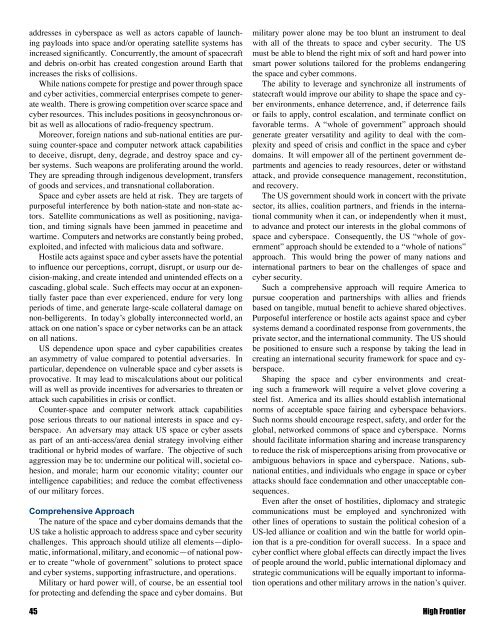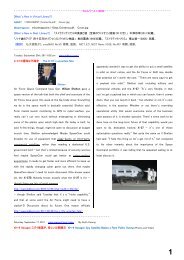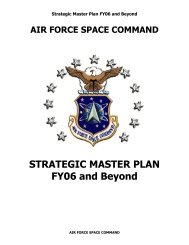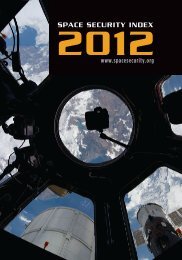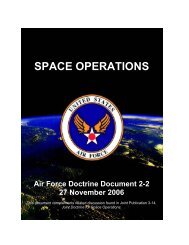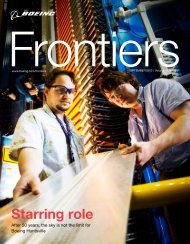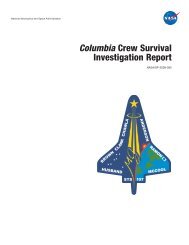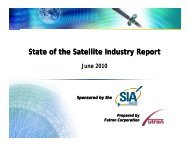Schriever Wargame 2010 - Air Force Space Command
Schriever Wargame 2010 - Air Force Space Command
Schriever Wargame 2010 - Air Force Space Command
Create successful ePaper yourself
Turn your PDF publications into a flip-book with our unique Google optimized e-Paper software.
addresses in cyberspace as well as actors capable of launching<br />
payloads into space and/or operating satellite systems has<br />
increased significantly. Concurrently, the amount of spacecraft<br />
and debris on-orbit has created congestion around Earth that<br />
increases the risks of collisions.<br />
While nations compete for prestige and power through space<br />
and cyber activities, commercial enterprises compete to generate<br />
wealth. There is growing competition over scarce space and<br />
cyber resources. This includes positions in geosynchronous orbit<br />
as well as allocations of radio-frequency spectrum.<br />
Moreover, foreign nations and sub-national entities are pursuing<br />
counter-space and computer network attack capabilities<br />
to deceive, disrupt, deny, degrade, and destroy space and cyber<br />
systems. Such weapons are proliferating around the world.<br />
They are spreading through indigenous development, transfers<br />
of goods and services, and transnational collaboration.<br />
<strong>Space</strong> and cyber assets are held at risk. They are targets of<br />
purposeful interference by both nation-state and non-state actors.<br />
Satellite communications as well as positioning, navigation,<br />
and timing signals have been jammed in peacetime and<br />
wartime. Computers and networks are constantly being probed,<br />
exploited, and infected with malicious data and software.<br />
Hostile acts against space and cyber assets have the potential<br />
to influence our perceptions, corrupt, disrupt, or usurp our decision-making,<br />
and create intended and unintended effects on a<br />
cascading, global scale. Such effects may occur at an exponentially<br />
faster pace than ever experienced, endure for very long<br />
periods of time, and generate large-scale collateral damage on<br />
non-belligerents. In today’s globally interconnected world, an<br />
attack on one nation’s space or cyber networks can be an attack<br />
on all nations.<br />
US dependence upon space and cyber capabilities creates<br />
an asymmetry of value compared to potential adversaries. In<br />
particular, dependence on vulnerable space and cyber assets is<br />
provocative. It may lead to miscalculations about our political<br />
will as well as provide incentives for adversaries to threaten or<br />
attack such capabilities in crisis or conflict.<br />
Counter-space and computer network attack capabilities<br />
pose serious threats to our national interests in space and cyberspace.<br />
An adversary may attack US space or cyber assets<br />
as part of an anti-access/area denial strategy involving either<br />
traditional or hybrid modes of warfare. The objective of such<br />
aggression may be to: undermine our political will, societal cohesion,<br />
and morale; harm our economic vitality; counter our<br />
intelligence capabilities; and reduce the combat effectiveness<br />
of our military forces.<br />
Comprehensive Approach<br />
The nature of the space and cyber domains demands that the<br />
US take a holistic approach to address space and cyber security<br />
challenges. This approach should utilize all elements—diplomatic,<br />
informational, military, and economic—of national power<br />
to create “whole of government” solutions to protect space<br />
and cyber systems, supporting infrastructure, and operations.<br />
Military or hard power will, of course, be an essential tool<br />
for protecting and defending the space and cyber domains. But<br />
military power alone may be too blunt an instrument to deal<br />
with all of the threats to space and cyber security. The US<br />
must be able to blend the right mix of soft and hard power into<br />
smart power solutions tailored for the problems endangering<br />
the space and cyber commons.<br />
The ability to leverage and synchronize all instruments of<br />
statecraft would improve our ability to shape the space and cyber<br />
environments, enhance deterrence, and, if deterrence fails<br />
or fails to apply, control escalation, and terminate conflict on<br />
favorable terms. A “whole of government” approach should<br />
generate greater versatility and agility to deal with the complexity<br />
and speed of crisis and conflict in the space and cyber<br />
domains. It will empower all of the pertinent government departments<br />
and agencies to ready resources, deter or withstand<br />
attack, and provide consequence management, reconstitution,<br />
and recovery.<br />
The US government should work in concert with the private<br />
sector, its allies, coalition partners, and friends in the international<br />
community when it can, or independently when it must,<br />
to advance and protect our interests in the global commons of<br />
space and cyberspace. Consequently, the US “whole of government”<br />
approach should be extended to a “whole of nations”<br />
approach. This would bring the power of many nations and<br />
international partners to bear on the challenges of space and<br />
cyber security.<br />
Such a comprehensive approach will require America to<br />
pursue cooperation and partnerships with allies and friends<br />
based on tangible, mutual benefit to achieve shared objectives.<br />
Purposeful interference or hostile acts against space and cyber<br />
systems demand a coordinated response from governments, the<br />
private sector, and the international community. The US should<br />
be positioned to ensure such a response by taking the lead in<br />
creating an international security framework for space and cyberspace.<br />
Shaping the space and cyber environments and creating<br />
such a framework will require a velvet glove covering a<br />
steel fist. America and its allies should establish international<br />
norms of acceptable space fairing and cyberspace behaviors.<br />
Such norms should encourage respect, safety, and order for the<br />
global, networked commons of space and cyberspace. Norms<br />
should facilitate information sharing and increase transparency<br />
to reduce the risk of misperceptions arising from provocative or<br />
ambiguous behaviors in space and cyberspace. Nations, subnational<br />
entities, and individuals who engage in space or cyber<br />
attacks should face condemnation and other unacceptable consequences.<br />
Even after the onset of hostilities, diplomacy and strategic<br />
communications must be employed and synchronized with<br />
other lines of operations to sustain the political cohesion of a<br />
US-led alliance or coalition and win the battle for world opinion<br />
that is a pre-condition for overall success. In a space and<br />
cyber conflict where global effects can directly impact the lives<br />
of people around the world, public international diplomacy and<br />
strategic communications will be equally important to information<br />
operations and other military arrows in the nation’s quiver.<br />
45 High Frontier


